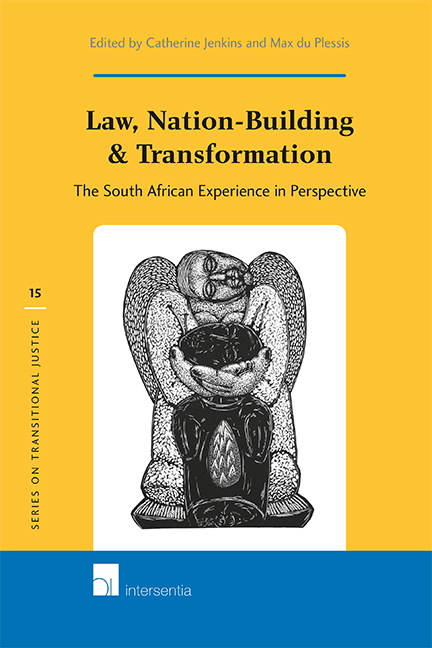Book contents
- Frontmatter
- Editors’ Foreword
- Contents
- Chapter 1 Transitional Justice: Lessons from South Africa?
- Chapter 2 Reflections on Post-Apartheid Nation-Building: Identity, Participation, Community
- Chapter 3 The Truth and Reconciliation Commission Process: A Retrospective
- Chapter 4 Rights at Work: The Transition to Constitutional Democracy and Women in South Africa
- Chapter 5 Crime, Policing and Nation-Building
- Chapter 6 Public Schools for Afrikaners in South Africa
- Chapter 7 Behind the Mask of the Rainbow Nation: The Limits of Law in Post-Apartheid South Africa
- Chapter 8 The Transformation of the Judiciary
- Chapter 9 Assessing the Social Transformation Performance of the South African Constitutional Court: From Totalitarianism to the Rule of Law
- Chapter 10 The Transformation of Land Law
- Chapter 11 The South African Presidency in Comparative African Context
- Chapter 12 Aspects of the Treatment of Freedom of Expression in South Africa’s Democratic Transition
- Chapter 13 Constitutionalism in Commonwealth Africa: Comparative Perspectives
Chapter 3 - The Truth and Reconciliation Commission Process: A Retrospective
Published online by Cambridge University Press: 16 December 2020
- Frontmatter
- Editors’ Foreword
- Contents
- Chapter 1 Transitional Justice: Lessons from South Africa?
- Chapter 2 Reflections on Post-Apartheid Nation-Building: Identity, Participation, Community
- Chapter 3 The Truth and Reconciliation Commission Process: A Retrospective
- Chapter 4 Rights at Work: The Transition to Constitutional Democracy and Women in South Africa
- Chapter 5 Crime, Policing and Nation-Building
- Chapter 6 Public Schools for Afrikaners in South Africa
- Chapter 7 Behind the Mask of the Rainbow Nation: The Limits of Law in Post-Apartheid South Africa
- Chapter 8 The Transformation of the Judiciary
- Chapter 9 Assessing the Social Transformation Performance of the South African Constitutional Court: From Totalitarianism to the Rule of Law
- Chapter 10 The Transformation of Land Law
- Chapter 11 The South African Presidency in Comparative African Context
- Chapter 12 Aspects of the Treatment of Freedom of Expression in South Africa’s Democratic Transition
- Chapter 13 Constitutionalism in Commonwealth Africa: Comparative Perspectives
Summary
‘…truth commission-type mechanisms cannot be concerned simply with issues of justice, but are intricately involved in and reflective of broader processes of nation-building.’
‘One has only to consider the counter-factual question – what difference would it have made if South Africa had moved from apartheid… without anything like the TRC process? – to realize how much more violent and dangerous our current scene might well have been.’
INTRODUCTION
My charge in this chapter is to look back at the Truth and Reconciliation Commission (TRC) process in South Africa and to evaluate its contribution or otherwise to the post-apartheid socio-political process. I should at the outset clarify my use of the term ‘Commission process’ as it is broader than the TRC event itself, it pre- and post-dates it. The Truth and Reconciliation Commission was a multi-faceted and protracted event covering the period 1996–2003. When I refer in this chapter to the ‘Commission process’, I go further back to the accountability debates in the exiled African National Congress (ANC) in the late 1980s and up to certain events of the present. So the term embraces a gamut of issues and events – those late-80s debates which acquired added relevance after February 1990, the indemnity and amnesty negotiations of the 1990–94 period, the debates around possible prosecutions in the post-TRC era as well as the discussions over forms of reparation and the heated arguments around the delays in paying them out. Finally, the continuing exhumations of the remains of some of the disappeared victims of the late-apartheid era also fall into this category. Each of these forms part of a complex tapestry which I refer to as the ‘Commission process’ and they form part of this retrospective evaluation. I will also draw on my own experiences from 1996–99 as a member of the TRC's Research Department and of the small group which wrote the first five volumes of the Final Report.
Many years have passed since the South African public and a wider international audience confronted the visual reality of South Africa's truth and reconciliation process. On 16 April 1996 in the Eastern Cape city of East London an international television audience watched a string of witnesses – widows and widowers, mothers and fathers, old struggle veterans – begin a story-telling process which was to mesmerize South Africa's people.
- Type
- Chapter
- Information
- Law, Nation-Building and TransformationThe South African Experience in Perspective, pp. 65 - 90Publisher: IntersentiaPrint publication year: 2014
- 2
- Cited by

